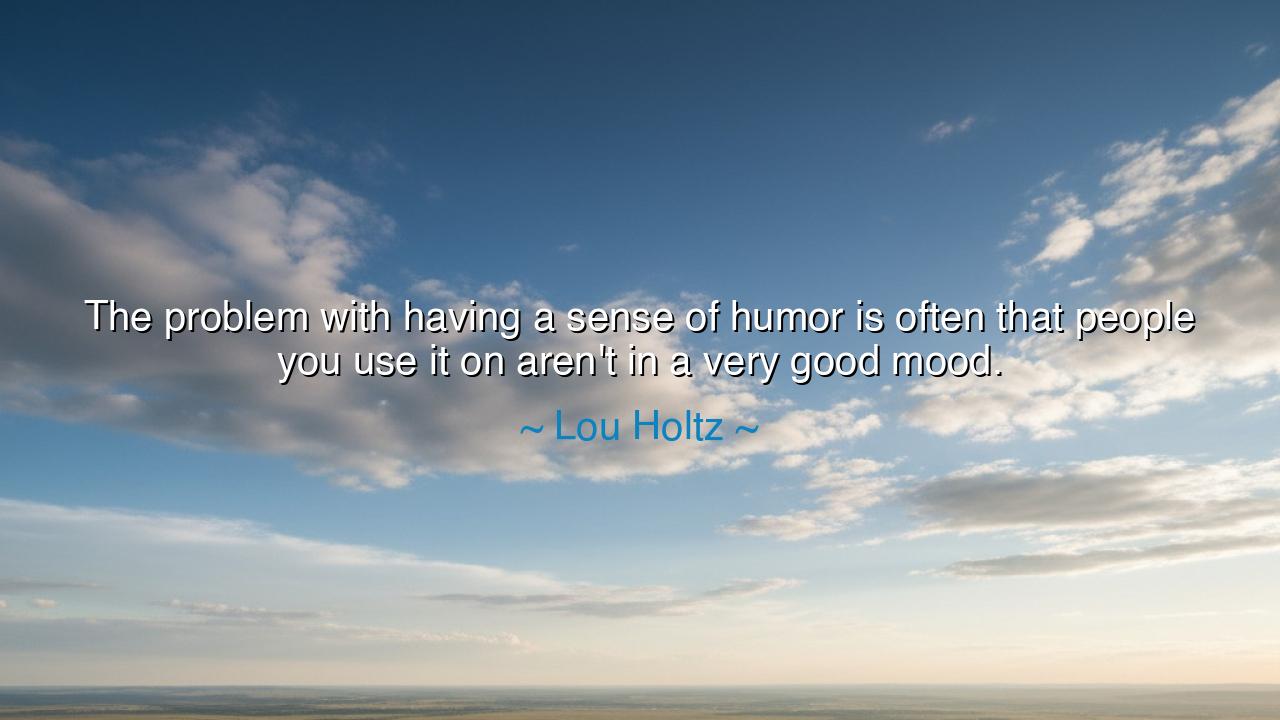
The problem with having a sense of humor is often that people you
The problem with having a sense of humor is often that people you use it on aren't in a very good mood.






“The problem with having a sense of humor is often that people you use it on aren’t in a very good mood.” Thus spoke Lou Holtz, the famed coach and philosopher of perseverance, whose humor often masked a deep understanding of human nature. In this seemingly light remark, he revealed a timeless paradox: that humor, though born of goodwill, does not always find the soil of the heart ready to receive it. The laughter that springs from one man’s joy may fall upon another’s sorrow, and the bridge that humor builds can sometimes crumble beneath the weight of misunderstanding.
From the earliest ages, the wise have known that humor is a delicate art — a divine fire that can warm the heart or scorch it. The ancients said that the fool and the sage both jest, but for different reasons: the fool to mock, the sage to heal. Yet even the most skillful jest can fail when it meets a soul shrouded in gloom. For laughter requires openness — a willingness to see the absurdity of life and yet smile at it. When a heart is clouded by anger, fear, or grief, humor becomes a stranger, unrecognized and unwelcome. Thus, Holtz’s words remind us not of humor’s weakness, but of the frailty of the human spirit that sometimes cannot bear the light.
Consider the story of Abraham Lincoln, whose sense of humor was as sharp as it was kind. During the dark years of the American Civil War, he often used laughter to soften grief, to relieve the burden of those who stood beside him. Yet there were times his jest fell cold. Once, after a crushing defeat, Lincoln told a light story in counsel with his generals, hoping to lift their spirits. But the room was silent — the men too burdened, too bitter to hear the gift he offered. Lincoln, with humility, bowed his head and said, “Gentlemen, you must pardon me; I forget myself in times such as these.” In that moment, we see the truth of Holtz’s saying: that even the noblest humor falters when it meets the heaviness of despair.
Still, the sense of humor remains a sacred gift. It is the soul’s rebellion against the weight of existence. Those who bear it often do so as healers, though their medicine is not always accepted. To make light of darkness is not to deny it, but to show that it can be endured. Yet, as Holtz warns, those who wield this gift must also possess wisdom — the discernment to know when laughter heals and when it wounds. For the heart that cannot receive humor is not evil, only weary. And the one who would bring laughter must learn patience and empathy, lest their light become another burden.
The philosophers of old understood this balance. Aristotle wrote that wit is the companion of wisdom, but excess wit is cruelty. The Stoics, too, taught that the wise man laughs not to mock fate, but to accept it. To possess a sense of humor, then, is to possess a kind of courage — to face the absurdity of life without bitterness. But this courage must be tempered with compassion, for laughter shared too carelessly may become a blade instead of a balm.
Let this be a lesson to all who delight in jest. When you speak with humor, speak with love. Gauge not only the cleverness of your words but the readiness of your listener’s heart. If they are burdened, let your laughter wait; if they are broken, let it soften into kindness. Remember that humor is not about triumphing over another, but about reminding both of you that life, for all its pain, still holds light enough to laugh.
And yet, do not lose heart if your jest is met with silence. Even if laughter does not bloom, your intention — to ease, to uplift, to connect — remains pure. The world needs such spirits, for humor is one of the last bridges between hearts divided by sorrow. Lou Holtz’s words, though wreathed in wit, carry a moral fit for all ages: that laughter is a flame, and those who bear it must carry it gently. For though some may not be ready to share its warmth, one day, when the shadows lift, they will remember that someone once tried to make them smile.
So, remember this wisdom: humor is sacred, but timing is divine. Cultivate both, and your laughter will become not just noise, but healing. Use it not to rise above others, but to rise with them. For though the world may sometimes be too weary to laugh, those who persist in sharing joy are the quiet architects of hope — and even when unreceived, their light still shines.






AAdministratorAdministrator
Welcome, honored guests. Please leave a comment, we will respond soon